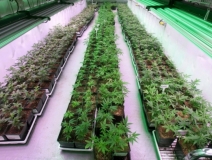With the advancement of big data, quality-assurance testing and cultivation methods, more career opportunities are becoming available in the marijuana industry in STEM-related fields.
To take advantage, leaders in the industry gathered in the District last week to help women and minorities navigate the market and learn more about the technology. They also hoped to encourage participants to network and build relationships.
Women Grow, a Denver-based nonprofit that works to increase opportunities for women in the marijuana industry, hosted the forum in partnership with the National Cannabis Festival, an annual D.C. music festival that focuses on music, education and marijuana advocacy.
“I met my core team [at Women Grow] and we all grew together, so we helped support each other,” said Chanda Macias, owner of the D.C.-based National Holistic Healing Center and one of the participants in the discussion. “It’s important to network the room and get to know who is who.”
Tiffany Burtt, chief technology and product officer for Bulb Wellness, a technology and wellness company still in its nascent stages, noted the entrepreneurial spirit of the marijuana industry and said successful business models used elsewhere can be applied to marijuana as well.
The forum evolved into a question-and-answer session to help guests prepare for jobs in the industry. A study published last year in the Marijuana Business Daily estimated the industry had between 165,000 and 230,000 full- and part-time workers. The industry could create more than 1 million jobs across the country if pot is legalized at the federal level, according to New Frontier Data, which supplies market analysis on the industry.
Giadha DeCarcer, chief executive of New Frontier Data, said those who want to build a marijuana-based business should become acquainted with those already in the industry and learn about laws and regulations.
“I know this is so cliche, but knowledge is power. It doesn’t matter what color you are, doesn’t matter how old you are, doesn’t matter what gender you are, you can acquire knowledge,” she said. “In this industry knowledge goes a long way.”
Macias said risk-taking is needed for marijuana entrepreneurs to succeed, particularly in an industry still deemed illegal by the federal government.
“As a black woman, no one was buying in my dream besides myself, so I had to put my dream forward,” Macias said. “For people who want to get started, you will have to make the initial sacrifice and build off your own pocket before you can get to an angel investor.”
For attendees thinking of transitioning to the cannabis industry, panelists urged them to apply existing job skills to new roles. A background in data, customer service, agriculture or retail could translate into jobs within the industry, organizers said.
Quierra Wells, 29, said the event inspired her to learn more about the industry before she begins work in March at a dispensary in Silver Spring.
“This was me going out there and getting myself out there,” she said. “I’m already excited about what I want to do.”
credit:washingtonpost.com






